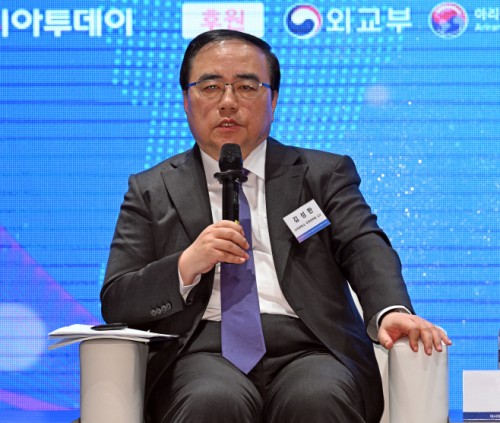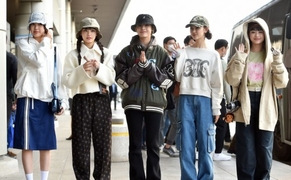 |
| Panelists discuss at AsiaToday’s Reception and Indo-Pacific Vision Forum 2023 in celebration of its 18th anniversary held at the CCMM Building in Seoul on Nov. 9, 2023. From left are Yoshihide Soeya, professor emeritus of Keio University; Daniel Russel, former U.S. Assistant Secretary of State for East Asian and Pacific Affairs; Kim Sung-han, a professor of Korea University’s Graduate School of International Studies; Yoon Young-kwan, professor emeritus at Seoul National University; and Lee Jung-hoon, professor at Yonsei Graduate School of International Studies. / Photographed by Song Eui-joo |
AsiaToday reporters Hong Sun-mi, Park Young-hoon, and Lee Ha-eun
AsiaToday held the Indo-Pacific Vision Forum 2023 in celebration of its 18th anniversary on November 9. At the panel discussion, various suggestions for prosperity in the Asia-Pacific region were made, including follow-up tasks to institutionalize the trilateral cooperation system, which began with the leaders of South Korea, the U.S., and Japan at Camp David back in April, trilateral cooperation tasks related to complex international situations such as the Russia-Ukraine war, and setting long term relations with China.
The panel discussion, led by Yoon Young-kwan, a professor emeritus at Seoul National University and former Minister of Foreign Affairs, has revealed the insights of foreign affairs and security experts.
“It is a very important and serious issue that the three countries of South Korea, the U.S., and Japan can cooperate to enjoy peace, stability, and prosperity in the Indo-Pacific region at a time when the overall international situation is changing, such as Russia’s invasion of Ukraine, the deepening conflict between the U.S. and China, and the war between Israel and Hamas.
 |
| Kim Sung-han, a professor of Korea University’s Graduate School of International Studies, speaks at AsiaToday’s Reception and Indo-Pacific Vision Forum 2023 in celebration of its 18th anniversary held at the CCMM Building in Seoul on Nov. 9, 2023. / Photographed by Song Eui-joo |
◇ Kim Sung-han: Southeast Asia, which sees South Korea as a role model, should be used as an asset for South Korea-U.S.-Japan cooperation
Kim Sung-han, a professor of Korea University’s Graduate School of International Studies who participated as a panelist, stressed the importance of cooperation with Southeast Asian countries.
“Southeast Asia is a region where the United States’ Indo-Pacific strategy and China’s Belt and Road Initiative (BRI) overlap,” prof. Kim said. “Since South Korea has become a country that gives aid from a country that received aid in the past, Southeast Asia tends to see South Korea as a role model rather than as a great power,” he said.
“If we use South Korea’s unique assets as another asset for cooperation with the U.S. and Japan, it can have an unexpected effect,” he said.
On the issue of Russia’s transfer of missile technology to North Korea amid strengthening cooperation between North Korea and Russia, prof. Kim said, “Since North Korea’s ICBM could threaten not only Washington but also Moscow, Russia will think carefully.”
“However, we should work closely with the United States and Japan, which can communicate with Russia and control its actions, and redouble efforts to prevent North Korea-Russia relations from crossing the red line,” he said.
 |
| Daniel Russel, former U.S. Assistant Secretary of State for East Asian and Pacific Affairs, speaks at AsiaToday’s Reception and Indo-Pacific Vision Forum 2023 in celebration of its 18th anniversary held at the CCMM Building in Seoul on Nov. 9, 2023. / Photographed by Song Eui-joo |
 |
| Yoshihide Soeya, Professor Emeritus of Keio University, speaks at AsiaToday’s Reception and Indo-Pacific Vision Forum 2023 in celebration of its 18th anniversary held at the CCMM Building in Seoul on Nov. 9, 2023. / Photographed by Song Eui-joo |
◇ Russel & Yoshihide: “South Korea-U.S.-Japan need to show strengths in climate change and food, beyond security”
Daniel Russel, former U.S. Assistant Secretary of State for East Asian and Pacific Affairs, said that South Korea, the United States, and Japan should let the world know that the “continuous democratic system” agreed at Camp David among the three countries is working well.
“It is important to show the three countries’ strengths in terms of protecting many countries from climate change, public health infrastructure, and food security,” he said.
Yoshihide Soeya, Professor Emeritus of Keio University, also stressed that “all treaties should be expanded globally beyond India and the Pacific” in order to effectively utilize Camp David’s trilateral cooperation.
As former U.S. Assistant Secretary Russel argues, prof. Yoshihide explained that the discussion should be expanded to include future and global issues beyond security, such as protection of democracy and global warming.
“There is a lack of minilateral cooperation between countries except the United States and China,” he said, adding that cooperation with “middle power” is one of the important tasks, referring to Europe, which had well established cooperative relations between the former Soviet Union and the United States.
“The long-term process goal is coexistence with China,” he said. “We don’t know how many years it will take, but it is an issue that cannot be overlooked.”
 |
| Jin Chang-soo, director the Japan Training Center at Sejong Institute, speaks at AsiaToday’s Reception and Indo-Pacific Vision Forum 2023 in celebration of its 18th anniversary held at the CCMM Building in Seoul on Nov. 9, 2023. / Photographed by Song Eui-joo |
◇ Jin Chang-soo: “We need to foster more Korea-Japan cooperation” · Lee Jung-hoon: “We need to launch the North Korean human rights foundation and resume psychological warfare against the North”
Jin Chang-soo, director the Japan Training Center at Sejong Institute, and Lee Jung-hoon, professor of the Graduate School of International Studies at Yonsei University, presented more detailed suggestions for stabilization of the Indo-Pacific region and follow-up tasks for the Camp David trilateral summit.
“Even though President Yoon Suk-yeol opened the door to Korea-Japan relations, there are still shortcomings,” director Jin said. “There is a lot of concern that the Seoul-Tokyo relations would be reversed when Yoon administration ends.”
“The most urgent task of the two countries is to allow people actually feel the improved bilateral relations, and only when this is the foundation can we move forward with the Indo-Pacific strategy,” he said.
Director Jin stressed the need to expand the Future Partnership Fund, which was created by both countries, saying, “We need to further expand cooperation for the future.”
“There is no actual discussion on what role Korea-Japan cooperation will play in the event of an emergency on the Korean Peninsula,” he said, adding, “There is only a role of the U.S. military, and it is time to discuss Japan’s role in the event of an emergency on the Korean Peninsula.”
Prof. Lee suggested that South Korea needs to take measures, such as the launch of the North Korean Human Rights Foundation and the resumption of psychological warfare against North Korea, to implement a value-oriented foreign policy.
“The North Korean Human Rights Foundation should be launched in the sense of humanitarian aid as well as holding North Korean human rights accountable,” prof. Lee said. “The Ministry of Justice should not only preserve records at the North Korean Human Rights Preservation Archives, but also hold accountability with such records.”
The professor also called for resumption of psychological warfare against the North, saying, “Why don’t you use psychological warfare when you are asking North Korea to dismantle its nuclear weapons and improve its human rights?”
#AsiaToday #Vision Forum
Copyright by Asiatoday
Most Read
-
1
-
2
-
3
-
4
-
5
-
6
-
7





















